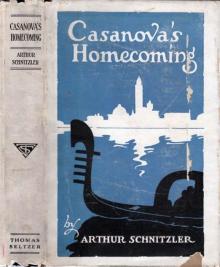- Home
- Arthur Schnitzler
Dying Page 2
Dying Read online
Page 2
The doctor was smoking his afternoon cigar when a lady was announced. Alfred’s consulting hours had not begun yet, and he was rather displeased. “Marie” he cried in surprise as she came in.
“Please don’t be cross with me for disturbing you so early. Oh, do go on smoking.”
“Well, if I may. But what is it? What’s the matter?”
She stood before him, one hand on his desk, the other holding her sunshade. “Is it true?” She uttered the words hastily. “Is it really true that Felix is so ill? Oh, you look pale. Why didn’t you tell me, why not?”
“What can you be thinking of?” He strode up and down the room. “This is foolish conduct. Please sit down.”
“Answer me.”
“He’s certainly unwell. That can’t be news to you.”
“He’s doomed,” she cried.
“Come, come!”
“I know he is; he knows too. He went to see Professor Bernard yesterday, and the Professor told him.”
“Many a professor has been mistaken.”
“You’ve often examined him. Tell me the truth.”
“There’s no absolute truth in such cases.”
“I see—you don’t want to say it because he’s your friend, isn’t that so? Yes, I can tell from your face. So it’s true, it’s true. Oh God, oh God!”
“My dear child, do calm down.”
She looked quickly up at him. “Is it true?”
“Well, he’s ill, you know he is.”
“Ah—”
“But why did the Professor tell him? And then—”
“Then? Then? Oh, please don’t give me hope if there isn’t any.”
“These things can never be predicted for certain. It could take a long time yet.”
“I know how long. A year.”
Alfred compressed his lips. “Can you tell me why he consulted another doctor?”
“Oh, because he knew you’d never tell him the truth—that’s all.”
“This is stupid,” the doctor said in annoyance, “just stupid. I can’t make it out! As if it were so urgently necessary to tell a man—”
At this moment the door opened and Felix came in.
“I thought as much,” he said, on seeing Marie.
“Nice tricks you get up to!” cried the doctor. “Nice tricks, I must say.”
“You can forget your fine phrases, my dear Alfred” replied Felix. “I’m very grateful for your goodwill—you’ve been a good friend, you’ve been wonderful.”
Here Marie interrupted. “He says the Professor can’t be cer—”
“Never mind that,” Felix interrupted. “You’ve all been able to keep me deluding myself up to this point. Taking it any further now would be a tasteless joke.”
“You’re little more than a child,” said Alfred. “There are many people walking around Vienna today who were told, twenty years ago, that they were on the point of death.”
“But most such people really are dead and buried.”
Alfred paced up and down the room. “Once and for all, nothing’s changed between yesterday and today. You’ll look after yourself more carefully now, that’s all, you’ll be following my advice better, which is all to the good. Only a week ago I was examining a man of fifty who—”
“Yes, I know,” Felix interrupted. “A man of fifty who was given up as a hopeless case at the age of twenty, and now he’s the picture of health and has eight healthy children.”
“Such things do happen, you can’t deny it,” objected Alfred.
“The fact is,” replied Felix, “I’m not the kind of man to attract miracles.”
“Miracles?” exclaimed Alfred. “I’m talking about perfectly natural phenomena.”
“But look at him, do,” said Marie. “I think he looks better now than he did last winter.”
“He just has to be careful of himself” repeated Alfred, stopping in front of his friend. “You two had better go for a stay in the mountains now and take things easy. Really easy.”
“Oh yes, when shall we start?” asked Marie eagerly.
“This is all nonsense,” said Felix.
“And then in the autumn you should go south.”
“And what about next spring?” enquired Felix ironically.
“Let’s hope you’re better then,” cried Marie.
“Better, yes,” laughed Felix. “Better! Well, at least my sufferings will be over.”
“I always say,” remarked the doctor “none of these great clinicians know the first thing about psychology.”
“Because they don’t realise that we can’t bear the truth” pointed out Felix.
“There are no hard and fast truths, I tell you. That man thought he’d better put the fear of God into you to keep you from doing anything reckless. That, roughly speaking, will have been the way his mind worked. And then, if you do get better in spite of his predictions, he doesn’t lose face because he was only warning you.”
“Let’s stop this childish argument” Felix said here. “I had a very serious conversation with the man, I made it very clear to him that I have to know for certain. Family matters, I said! That always impresses people. And to be honest with you, I’ll admit that the uncertainty was too hard to bear.”
“It’s not as if you were certain now,” Alfred objected.
“Yes, I am certain now. You’re going to unnecessary trouble. All I have to think of at this point is how to spend my last year as wisely as possible. Wait and see, my dear Alfred, I’m a man who will leave this world smiling. No, don’t cry, sweetheart; you’ve no idea how delightful you’ll still find the world without me. Don’t you agree, Alfred?”
“Oh, for goodness’ sake, you’re distressing the girl unnecessarily.”
“It’s true, a complete break would be more sensible. Please leave me, sweetheart, let me die alone!”
“Give me some poison!” Marie suddenly demanded of the doctor.
“You’re both out of your minds,” cried Alfred.
“Poison! I don’t want to live a second longer than he does, and I want him to believe it. But he won’t. Why not? Why not?”
“Listen, sweetheart, I have something to say to you now. If you mention such nonsense once again, just once again, I shall disappear without trace. Then you won’t see me again anyway. I have no right to chain your fate to mine, and I don’t want the responsibility.”
“And you listen to me, my dear Felix,” began the doctor. “You will kindly be good enough to leave the city today rather than tomorrow. You can’t go on like this. I shall take the pair of you to the railway station this evening, and I hope peace and quiet and good invigorating air will help you both to see reason again.”
“I entirely agree with you” said Felix. “It makes no difference to me where—”
“And moreover,” Alfred interrupted “there’s no reason at all to despair for the moment, so you can stop making dismal remarks.”
“A great psychologist!” said Felix, smiling. “When a doctor’s so rough with his patient, the patient feels better at once.”
“More than anything else I’m your friend. So as you know, you should—”
“Leave—tomorrow—for the mountains!”
“Yes, quite so.”
“Well, thank you very much, anyway,” said Felix, shaking hands with his friend. “And now we’ll be off. I can hear someone clearing his throat outside already. Come along, sweetheart!”
“Thank you, Doctor,” said Marie as they left.
“No need to thank me. Just be a sensible girl and look after him. Goodbye, then.”
On the steps outside, Felix said abruptly, “A nice fellow, the Doctor, don’t you think?”
“Oh, yes.”
“And young and healthy, with perhaps another forty years in front of him—or a hundred.”
They were out in the street now, surrounded by people who were talking and walking, laughing and living, without a thought of death in their minds.
They found a small
house close to the lake. It stood a little way from the village itself, one of the last stragglers in the row of houses beside the water. Behind the house, meadows covered the hills, and further up there were fields full of summer flowers. Far beyond those, only occasionally visible, was the indistinct outline of the distant mountain range. And when they came out of their house on to the balcony that stood on four damp brown stilts above the clear water, they were looking straight at a long line of rocks on the opposite bank of the lake, with the cold gleam of the silent sky resting above them.
During the first days of their stay here, they had felt wonderfully peaceful in a way that they themselves could hardly understand. It was as if the general fate of all mankind had power over them only where they usually lived; here, in these new surroundings, the sentence of death pronounced in another world no longer held good. Not since they first met had they found solitude so refreshing. Sometimes they would look at one another as if there had been some small incident in the immediate past, maybe a quarrel or a misunderstanding, but it mustn’t be mentioned again. On those fine summer days Felix felt so well that soon after his arrival he said he wanted to get back to work. Marie didn’t agree. “You’re not entirely better yet,” she smiled. And the sunlight danced on the little table where Felix had stacked his books and papers, while soft, caressing air that knew nothing of all the world’s unhappiness wafted in from the lake and through the window.
One evening, as their habit was, they hired an old man from the village to row them out on the lake. The boat was a good, sturdy craft with an upholstered seat where Marie would sit while Felix lay at her feet, wrapped in a warm grey rug that served as both cushion and blanket. He had laid his head on her knees. A light mist lay over the placid, broad expanse of water, and it seemed as if twilight were slowly rising from the lake and spreading gradually to the banks. Today Felix ventured to smoke a cigar, and he looked out over the rippling lake to the rocks with their summits bathed in muted yellow sunlight.
“Tell me, sweetheart” he began, “do you dare to look up?”
“Look up where?”
He pointed to the sky. “Right up there, into the dark blue. I can’t do it myself. It strikes me as eerie.”
She looked up, letting her glance rest on the sky for some seconds. “I rather like it,” she said.
“You do? When the sky’s as clear as it is today, I can’t make sense of it at all. That distance, that terrible distance! If there are clouds up there I don’t feel so ill at ease, the clouds are part of our world—I’m looking at something I know.”
“There’ll most likely be rain tomorrow,” remarked the boatman. “The mountains look too close today!” And he let the oars rest so that the boat glided over the water in silence more and more slowly.
Felix cleared his throat. “How odd; I’m not really enjoying this cigar.”
“Throw it away, then!”
Felix turned the glowing cigar in his fingers once or twice, then threw it into the water, and said, without turning to Marie “Well, I suppose I’m not quite better yet.”
“Oh, hush!” she contradicted him, caressing his hair gently with her hand.
“What are we going to do if it rains?” asked Felix. “You’ll have to let me work then.”
“No, you mustn’t.”
She leaned down and looked into his eyes. It struck her that his cheeks were flushed. “I’ll soon drive away your gloomy thoughts! Don’t you think it’s time to go home? It’s turning chilly now.”
“Chilly? I don’t feel cold.”
“Oh, well, you have your thick rug.”
“What an egotist I am!” he cried. “I quite forgot you were wearing a summer dress.” He turned to the boatman. “Home, please.” A few hundred oar-strokes, and they were close to their house. Then Marie noticed that Felix was clasping his left wrist in his right hand. “What is it?” she asked.
“Sweetheart, it’s true, I’m not quite better yet.”
“But …”
“I must be feverish. How stupid!”
“I’m sure you’re wrong,” said Marie anxiously. “But I’ll go for the doctor at once.”
“Oh, for goodness’ sake, that’s all I need!”
They had come to the bank and went ashore. It was almost dark indoors, but their rooms still held the day’s warmth. While Marie prepared their evening meal Felix sat quietly in an armchair.
“Do you realise?” he said suddenly. “Our first week here is over.”
She came quickly over from setting the table and put both arms round him. “What is it?”
He freed himself. “Ah, never mind that!” Rising, he sat down at the table, and she followed. He drummed his fingers on the table-top. “I feel so defenceless. It suddenly comes over one.”
“Oh, Felix, Felix.” She drew her chair close to his. He was looking around the room, eyes very wide. Then he shook his head with annoyance, as if irritated by something that he couldn’t grasp, and said between his teeth, “Defenceless! I’m defenceless! No one can help me. The thing itself isn’t so terrible—but it’s being so defenceless!”
“Felix, please, don’t agitate yourself. I’m sure it’s nothing. But would you like me … just to reassure you … would you like me to go for the doctor?”
“Oh please, stop that! I’m really sorry to keep entertaining you with talk of my illness.”
“But—”
“It won’t happen again. Pour me some more wine, will you? Yes, yes, some more—thank you. Now, talk to me about something.”
“About what?”
“Anything. Read aloud if you can’t think of anything to say. Oh, I’m sorry, after supper, of course. Eat your supper, and I’ll eat too.” He picked up knife and fork. “I even have an appetite. This tastes really good.”
“There we are, then,” said Marie, forcing a smile. And they both ate and drank.
The next few days brought warm rain, and they sat sometimes indoors, sometimes out on the balcony until evening. They both read, or looked out of the window, or he watched her when she picked up a piece of needlework. Now and then they played cards, and he taught her the rudiments of chess. At other times he lay on the sofa, and she sat beside him to read aloud. Those were quiet days and evenings, and Felix really did feel quite well. He was glad to discover that the bad weather didn’t affect him, and his fever did not return.
One afternoon, when the sky seemed to be clearing at last after a long rainy period, they were sitting on the balcony again, and Felix said abruptly, without referring back to any earlier conversation:
“In fact the whole world is full of people condemned to death.”
Marie looked up from her needlework.
“For instance” he went on, “suppose someone told you: young lady, you’re going to die on the first of May 1970. You’d spend the whole of the rest of your life in nameless dread of the first of May 1970, although I feel sure you don’t at this moment seriously believe you’ll live to be a hundred.”
She did not reply.
He went on, looking out at the lake, which was just beginning to gleam as the sunlight broke through. “Other people are walking around now, confident and healthy, but some stupid accident will carry them off within a few weeks. They aren’t thinking of death at all, are they?”
“Oh dear,” said Marie “stop thinking such stupid things, do! Surely even you realise that you’re getting better.”
He smiled.
“I mean, you of all people are one of the kind who do get better.”
That made him laugh out loud. “My dear child, do you seriously think Fate can take me in? Do you think I’m deceived by this apparent sense of well-being, Nature’s gift to me just now? It’s purely by chance that I know how things are with me, and the thought of imminent death makes me a philosopher—like other great men in their time.”
“Stop it at once, will you?”
“Oho, my dear young lady, so I’m to die and you’re not even to suffer the minor incon
venience of hearing me talk about it?”
She threw aside her needlework and went over to him. “I can feel,” she said in a tone of genuine conviction, “I can feel that you’ll stay with me. You can’t be the judge of your own recovery. What you have to do now is stop thinking about it, and then this dark shadow will lift from our lives.”
He looked at her for a long time. “You really do seem absolutely unable to grasp it. I must make it more obvious. Look at this.” He picked up a newspaper. “What does it say?”
“The twelfth of June 1890.”
“That’s right, 1890. Now imagine the number at the end of that date is one instead of zero. When the date says that, it will all be over. Now do you understand?”
She snatched the newspaper from him and threw it angrily on the floor.
“It’s not the paper’s fault,” he said calmly. And suddenly, rising energetically and apparently making a swift decisions to dismiss all such thoughts, he cried, “Look, how beautiful! See the sun over the water—and there,” he added, leaning over the balcony and looking at the low-lying land on the other side “see the crops in the fields moving in the wind. I’d like to go out for a little while.”
“Won’t it be too damp for you?”
“Come along, I need some fresh air.”
She dared not oppose him.
They both took their hats, put on their coats, and set off along the path leading to the fields. The sky was almost completely clear now. White mist drifted over the distant outline of the mountains, forming a multitude of different shapes. The green of the meadows was almost lost in the white-gold radiance that seemed to surround the whole area. Soon the path brought them to the middle of the cornfields, and they had to walk in single file while blades rustled as they brushed the hems of their coats. Before long they turned off the track into a wood of broad-leaved trees, not too dense, with well-tended pathways and benches at frequent intervals where walkers could sit down and rest. Here they went arm-in-arm.
“Isn’t this beautiful?” cried Felix. “And the air’s so fragrant!”

 Dying
Dying Late Fame
Late Fame Dream Story
Dream Story Casanova's Homecoming
Casanova's Homecoming